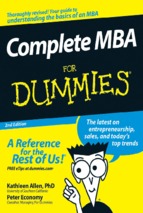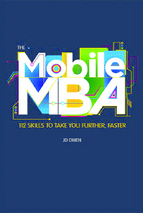How to grow your internet business without
doing it all yourself
by Paul Isaac
About the author
Paul Isaac is the founder of two digital marketing agencies and has marketed global brands the world over. When
yesterday’s digital marketing techniques stopped working, he and his company spent four years pioneering new ones
which did.
Born in the UK, he currently lives in the Netherlands and is still a frequent visitor to the UK, as well as the USA and
Sweden where he has family. He spends his days getting hands-on with marketing for his global clients and cycling
enthusiastically across the flat Dutch countryside.
You can reach him at
[email protected]
The easy way to read this book.
You’re a busy person. Ever since all our labour saving devices like computers and mobile
phones were invented, we somehow have a lot more work.
I’d love to think you’re going to read every last word of this book - I nearly broke into a
sweat writing some of it - but if you want to get up and running as fast as possible then,
especially for you, I’ve including a Wrap Up section at the end of each chapter to give you
the key points from that chapter. You could read all of these Wrap Ups first, then go to the
last chapter which is a quick How-To-Get-Started guide. Then you’ll be off and running,
making so much money you can afford the time to come back and read the rest of it.
The internet and an ancient Chinese general
Before the internet bubble burst in 2001 there was a lot of talk about how traditional
businesses didn’t “get” the internet. We don’t hear so much from those people any more.
The bubble burst, they were proved wrong. The reason they were wrong was that they
thought the new technology made the old basics obsolete.
We’re going to be discussing a lot of very modern ways to do marketing in this book, but
let’s not get lost. People are still people and selling is still selling. In the end, the internet
is just a channel, a new way for us to communicate with each other. It may be a major
channel which has disrupted commerce in a way not seen before in our lifetimes, but it’s
still a channel. And perspective matters.
To keep that perspective, I’m going to be diving back into a work which was written in the
fifth century B.C. : The Art of War by the Chinese general Sun Tzū. I chose this book
because it’s out of copyright so I won’t have to pay royalties if I quote it. Ha, ha. No, not
really. I chose it because its principles of strategy apply equally well to business as to war.
These are the basics.
Marketing ideas come and go, gee, if I only had a dollar for every new book on the subject
that comes out. But the basic principles endure. The Art of War was written from a
military perspective, but it’s about strategy and those strategic principles apply to
marketing in a big way.
Here’s one of my favourite quotes from it to get you thinking:
“Hence in the wise leader’s plans, considerations of advantage and disadvantage
will be blended together.”
I’ve seen an awful lot of companies violate this. For example, they make a sales budget
based on new business they will gain. However, they never allowed that the competition
would probably come in and take some of their existing business from somewhere, in
other words, they did not allow for disadvantages. If they had, they would have realised
that they needed to target a lot more new business to meet their sales goals.
Or, to give you another example, I’ve seen companies go after new business by competing
on price, and then be surprised when the competition lowered theirs in response. This all
sounds like common sense, but it gets ignored more often than you’d imagine.
——————————————
Alright, that’s all the warming up you’re going to get. If you’re ready for some
controversial views, some strange humour and (hopefully) some genuine insights into
doing business on the internets, let’s get started.
Chapter 1
They’re just not that into you.
A few basic lessons in marketing
1. Marketing is easy
Marketing is easy? Not every struggling business owner would agree and so to explain
this statement, I need to tell you a little about my story, but that’s okay, I like talking about
myself.
For more than ten years I worked at a billion dollar multinational electronics company.
Our complex products were designed by teams of highly qualified engineers using every
tool in the modern design toolbox from Computer-Aided-Design and Project Management
Software to Six Sigma quality systems.
And then there was me. No specific skills, couldn’t draw a new product design let alone
manufacture one, dropped out of university, former semi-professional bass player,
sometime warehouse operative. Probably if I honestly took my recognised professional
skills, I could write them on a small set of cards and teach them to someone in an
afternoon.
I felt most guilt about that, when reflecting on the benefits my team of product managers
enjoyed: good salaries, better offices than the engineers, free access to senior management
(although you might question if that was really a benefit had you ever met some of them),
international travel and the best restaurant food.
Oh yes, especially the international travel and great food!. My personal favourites from
that time included the week long sales conference at Phuket Beach, Thailand. I had
arrived at the resort following a week in Shanghai and Singapore and had conveniently
arranged to stay there in Thailand at the beach rather than in Singapore for the intervening
weekend. A top hotel in one of the world’s leading resorts, two days relaxing on the
beach, meals all-in and everything paid for by the company. Working life doesn’t get
much better than that.
Or there was another trip I will never forget. I found myself wearing a suit, carrying a
small briefcase containing my laptop, standing in a small speedboat on a balmy late
September day as it took me across from a small village on the southern French coast to a
resort island a few miles offshore. This was something I had never planned for myself and
would never have envisioned, but if this was my working life, then it wasn’t half bad.
Now, I am not the world’s greatest drinker but I am a great connoisseur of good food and
once again the company effectively paid for my doctorate level study of the world’s major
cuisines in their native habitats. For the record, my personal list of the top three global
cuisines ends up with France at number one, followed by Italy and China in joint second
place.
There were still further benefits accruing to we marketers: company apparel and freebies.
We were more presenters than participants at the various regional sales and marketing
meetings, yet we somehow still qualified for the T—shirts, pens, hats, kit bags, towels,
whatever, that the attendees got. Some of it I wore, while other items went fairly quickly
to charity shops and other good causes. Even now, there must be entire third world
villages wearing clothes painted with our company logo. You can see some of it in my
resignation photo below.
One last comment to end this annoying boasting. To this day, I still haven’t managed to
spend all the frequent flyer points I built up during that globetrotting phase of my life.
There are still several free holidays to go.
Why then, were we spoiled like this, compared to the engineers who actually designed the
products the company sold. To this day I’m not totally sure. Engineers are surely
undervalued and if I had to argue my case with one of them, I’d probably lose. However,
it comes down to the basics of all marketing.
And the basic of all marketing is: Understand the customer.
It’s not about you or your product, it’s about what the customer wants. That’s why I called
this chapter Marketing Is Simple. In fact it’s so simple that most people can’t do it. Proof
of some of my “luxury” side benefits: I dressed purely in company items for my last day
as a wage slave.
Figure 1.1 My last day as a wage slave
2. No, they’re really not that into you
Let’s assume for a minute that engineers are more intelligent than marketing people. It
might well be true and I for one am prepared to let it slip by. So if marketing is also
relatively easy to do, then why wouldn’t an engineer change career and get himself an
easier life with more fringe benefits and a higher salary?
I believe the answer is that before you can do this simple job, you have to unlearn a whole
lot of baggage and assumptions you’ve been making, since starting business life.
In my globetrotting days, I was invited all over the world to make presentations at sales
and marketing meetings. My presentations mainly consisted of some good jokes and cool
graphics held together by a vague smattering of content, so I didn’t consider them good
value, but I was asked to go, so I went. I mean, it was better than sitting behind a desk
doing emails all day.
What it also gave me was the opportunity to observe other people’s presentations, to write
silly poems on the free notepads and to make the sort of philosophic observations about
life that any bored person would do under such circumstances. And the main conclusion I
drew was that people are just way, way, way too much into their own product with no idea
that others might not be anywhere near as enthusiastic about it as they are.
If you are presenting your company to a customer or potential new customer, you can’t
assume any level of interest at all. They’re just not that into you. They are already mired
in their own product or service, their work problems, their personal problems. But
somewhere you taught yourself that they would automatically be focussed on the same
thing you’re interested in and, frankly, you’re going to have to unlearn this delusion fast,
or you’ll never be able to do something as simple as marketing.
At its most basic, marketing is about seeing things from the customer’s point of view. If
you are so caught up in your own then you will never do that. You may think what I’m
saying is obvious, but the reason I’m hammering it, is that it’s really a lot harder than it
looks. It was watching the worst presenters at these conferences I attended that really
brought the lesson home to me.
Exhibit one: This guy had such a complicated set of slides that he had to present it with his
back to the audience, reading the text of his own slides off the screen because it was too
much to remember what he’d written. There’s nothing stranger than watching than a guy
with a microphone talking loudly at a screen. Even more so, when he appears to be
genuinely surprised at the sheer brilliance of each slide (which he had written), as it comes
up before him.
We could call that bad presentation technique, which is true, and leave it at that. However,
if you only slightly thought about it: How difficult would you want to make it for your
customers/audience to find out about your product? Why give them an excuse to go to
sleep?
In case you doubt, then I give you Exhibit Two. This engineer put up a complicated slide
consisting of a big table full of detail, much of which was difficult for me to understand,
and I worked in the company and already knew his products. Before anyone could even
read it, he immediately started expanding on the table as though we had already studied it
thoroughly and were familiar with all its detail. It’s true he was talking to a room full of
technical people, people who had a need for components like the ones we made. But they
weren’t people who went to work every day living and breathing every detail of what we
did. I’m sure they weren’t able to follow more than 10% of what he said.
Where I am going with this is: In your sales pitches, in your literature, on your website,
wherever you want to communicate to your customers, don’t start by assuming they’re
even interested. IF you assume they couldn’t give a fig, and start from there, then you’re
more likely to actually get them to listen.
Obviously I’m not the first person to have this theory. There is an expression which came
from engineering and which you’ll also find in some marketing books: KISS (Keep it
simple stupid).
But others have said the same thing in different ways. I really like the following guide to
making a presentation, which apparently came from Aristotle:
✴ Tell them what you’re going to tell them
✴ Tell it to them
✴ Tell them you told it
Follow those three rules and you can keep your audience long enough to deliver your
message.
There is, however, an even more basic idea underneath the above:




















